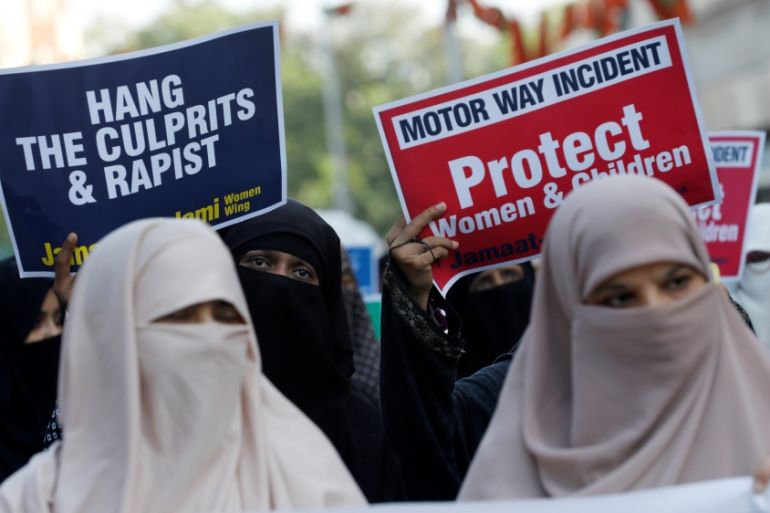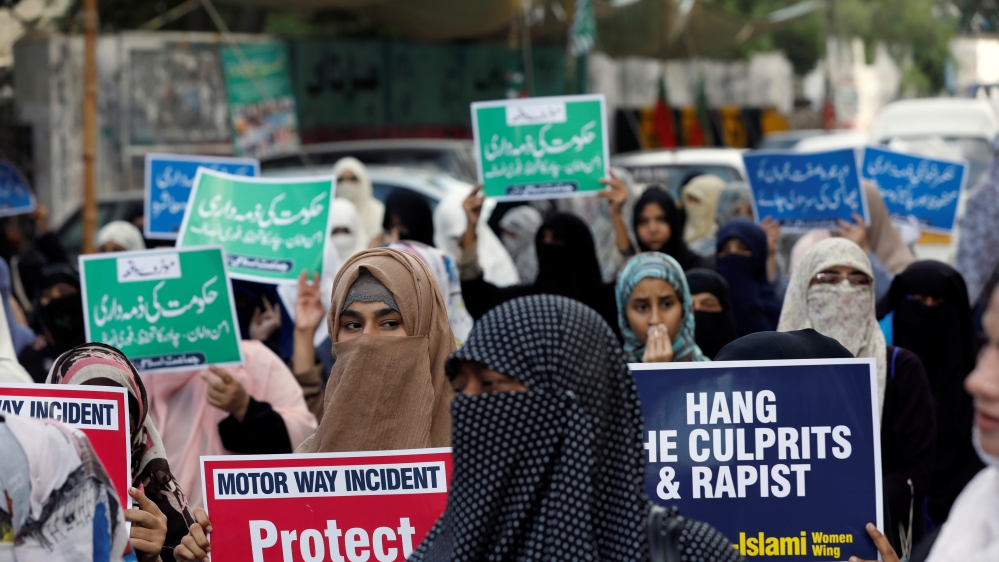‘Heinous, barbaric’: Pakistan highway rape sparks outrage
Police investigating robbery and rape of woman after her car broke down on the highway in Punjab province.

Karachi, Pakistan – Police in Pakistan have arrested 15 people believed to be linked to the rape of a woman on a major highway, an incident that has attracted national outcry with demands for greater justice for victims of sexual violence.
The woman was attacked when her car broke down in the early hours of Thursday while she was driving from the city of Lahore, capital of Punjab province, to Gujranwala with her children.
Keep reading
list of 4 itemsAustralia’s counterterrorism team arrests seven teens in overnight raids
‘Battlelines’ drawn as jury hears opening remarks in Trump hush money case
Two Mexican mayoral contenders found dead on same day
Unidentified assailants attacked her as she stopped her vehicle, smashing her car window before raping her in a nearby field and robbing her of cash and jewellery.
Local media reported that her children were made to watch.
None of the 15 people arrested is believed to be part of the group that attacked her, police told the Associated Press.
On Friday, provincial police said the newly constructed highway did not have any police deployed to protect travellers, and that they would be commencing those duties.

‘Victim blaming’ outrage
Shortly after the incident, Lahore police chief Umar Shaikh became the subject of national outrage when he appeared to blame the victim for the rape, saying the woman should not have been travelling alone at that time.
Shaikh, newly appointed to the post after some political controversy, is facing demands to resign.
“Such statements from people in charge should start with an apology in failing to protect citizens of Pakistan,” Khadija Siddiqui, an activist and lawyer who was stabbed 23 times in an attack in 2016, told Al Jazeera.
“They should apologise that women in this country have to suffer every day,” she said, adding that police officers who dealt with gender-based violence were often “part of the problem”.
“They are complicit. Such people shouldn’t be in these posts in the police sector where we expect them to be protectors of the state.”
|
|
Tahira Abdullah, a veteran human rights defender, was also angered by the incident.
“This is just the tip of the iceberg of violent crimes committed against women and girls which never get reported, especially in our rural [areas],” said Abdullah.
However, she said: “It is a positive sign that this particularly heinous, barbaric gang rape and robbery case is receiving a lot of publicity, which just might lead to concrete action.”
Pressing for drastic police reform on gender-based violence cases, Abdullah said there is a need for carefully designed training to inculcate the spirit of community-friendly policing.
“Each province needs a gender crimes unit staffed by specially trained women, along with hotlines, crisis shelters, immediate medico-legal aid, DNA testing, help in registering the case at the nearest police station, and longer-term PTSD trauma counselling and therapy.”
Widespread condemnation
Prime Minister Imran Khan’s office said the protection of women was a priority for the government, adding that “such brutality and bestiality cannot be allowed in any civilised society. Such incidents are a violation of our social values and a disgrace to society”.
Pakistan’s human rights minister, Shireen Mazari, strongly criticised Shaikh for blaming the victim.
For an officer to effectively blame a woman for being gang raped by saying she should have taken the GT Road or question as to why she went out in the night with her children is unacceptable & have taken up this issue. Nothing can ever rationalise the crime of rape. That's it.
— Shireen Mazari (@ShireenMazari1) September 10, 2020
According to the Punjab police, there have been at least 2,043 registered cases of rape and 111 cases of gang rape in the province this year.
Harris Khalique, secretary-general of the independent Human Rights Commission of Pakistan (HRCP), said violence against women and children has increased over the last few years, during which HRCP has registered an average of 10 cases of gender-based violence a day, including sexual assault and the rape of minors.
“The gravity of the situation of the incident on the highway is the woman begging the police for the case not to be made public,” said Khalique.
“Stigma is attached to it and the victim is blamed. A woman is raped in front of her children, and the police chief of Lahore has the gall to say why she was driving late at night on her own.
“Legal and policy measures need to be taken. The attitude change in society has to be brought, the increasing misogyny and intolerance of difference of opinion are all linked to each other,” said Khalique.
The horrifying gang rape of a woman in the #motorwayincident is a grim reminder that Pakistan has become an increasingly dangerous place for #women. Not only must the perpetrators be brought to justice, the Motorway police must also be taken to task for failing to respond. 1/2
— Human Rights Commission of Pakistan (@HRCP87) September 10, 2020